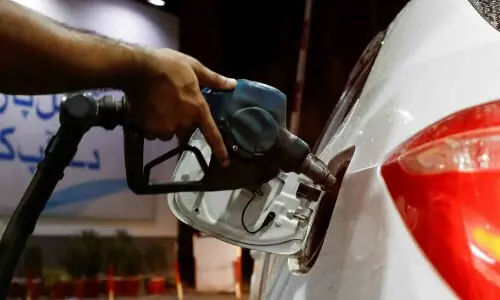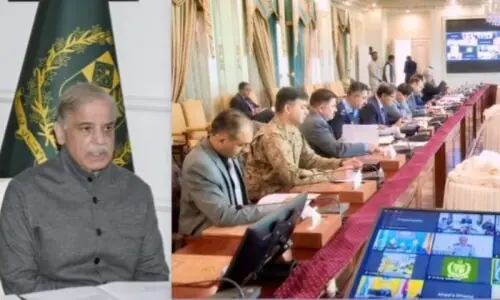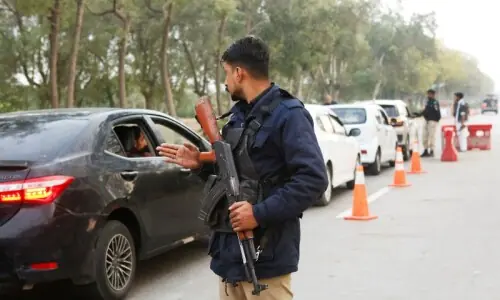Stock market turmoil
THE worsening housing loan problem in the United States rattled the global financial markets, and world stocks tumbled for fear of a credit crunch and the possible slowing down of the American economy. Both the developed and emerging markets were affected according to their exposure to the global financial markets, and finally induced the US central bank to cut its primary interest rate from 6.25 to 5.75 per cent. The western bourses bounced back after what some people describe as “brutal correction”. Earlier, the US Federal Reserve and the European Central Bank had injected billions of dollars into their financial markets to dispel fears of a credit crunch. But the risks from frequent and abnormal capital market ups and downs have not gone away and are underpinned by the global economic imbalances, worsened by lack of market discipline, the absence of transparency, excessive speculation and enormous liquidity piling up for lack of productive outlets. A cautious approach is therefore needed by emerging markets like Pakistan’s seeking portfolio investment which last year surged to $3.2 billion — a high proportion of the total investment of $8.4 billion. Given the political and security risks, an international credit rating has just downgraded Pakistan’s economic outlook from positive to stable. Even when the fundamentals of the domestic economy are strong, as in the case of the East Asian crisis of the late 1990s, any turmoil in the financial markets can still be highly damaging.
In three weeks, the KSE index of 100 shares plummeted by seven per cent following the outflow of foreign portfolio investment, fears of more pullouts and the market perception of political uncertainty. From July 1 to August 15, the outflow was $124 million against the last fiscal year’s total inflow of $970 million. As the investment withdrawn by foreign fund managers was not sizable and foreign exchange reserves were at a comfortable level, the rupee remained stable. Yet the risks to the exchange rate can be assessed by the Indian rupee falling to 41.36 from a high of 40.2 per dollar last month, following the pullout of portfolio investment of $750 million in August from the Bombay Stock Exchange. The hedge funds hit by the US mortgage loan crisis, which hold about 50 per cent of about $10 billion investment in Indian stock markets, were seen withdrawing their money. What has happened in Mumbai cannot be ruled out here if the trends in hot money inflows are not kept within prudent limits — more so as the local stock markets lack depth that provides the opportunity for much of the speculative activities.
While the financial system is the only sector to be truly globalised, it is the most risk-prone segment of the international economy. The multi-dimensional risks to finance capital are covered by enormous hedging of doubtful quality. Currently, some of the hedge funds are in trouble because of the high-risk sub-prime loan crisis. The hedge fund operations are neither transparent nor are they accountable to the regulators. The risks are spread over a number of financial institutions that has increased the vulnerability of the entire financial system. Much of the financial transactions are not trade-related. Money thus made is not converted into productive capital. The financial sector is no longer seen as a traditional service provider. The whole financial system is beset with enormous problems and needs radical restructuring.
Plight of senior citizens
IT IS hard to explain why the government has taken so long in setting up the Pakistan Senior Citizens Welfare Council. A bill providing for this body with an initial funding of one billion rupees has been lying before the cabinet for quite some time now. The delay has been so inexplicable that it has now attracted the attention of the Supreme Court. This may prompt the cabinet to expedite the consideration of the draft so that the National Assembly can initiate the legislation process. But this will only be the first step. Implementing the measures contained in it will be the next. Even then the senior citizens, who now constitute 12 per cent of the population, will not get all the relief they rightfully expect and need. The odds are heavily stacked against them, and the bill only provides for ad hoc measures that may prove no more than a drop in the ocean.
The increase in the number of people above 60 years of age has now magnified the problems that have always existed. These are of a specific nature and call for serious attention on a long-term basis. For instance, ensuring that they receive their pension in time, as the bill provides for, is not enough. The pension needs to be enhanced as should also be done in the case of the return on saving schemes which have been the financial mainstay of senior citizens at a time when they are no longer economically active. The worst casualty of old age is inevitably good health — more in some people and less in others. But the medical profession in Pakistan has yet to provide for geriatrics as a specialised discipline. This deficit will not be made up by free counters for the elderly in government hospitals. Even housing is not always taken care of, especially for people who need shelter and do not have a family to look after them. Even those who have the resources fail to obtain the services of attendants operating under a regulated system. These are problems that need to be addressed rather than simply providing senior citizens concession in travel fares or free entry into museums as the bill provides for.
Menace of aerial firing
WHY people continue to fire guns in the air to mark a celebration, despite the proven dangers to life and limb, remains baffling. On Friday, a young girl died in Peshawar during aerial firing at a wedding while her mother sustained serious injuries. There are numerous instances to quote of deaths and injuries being caused by aerial firing. In January a young man died in Lahore and two others were injured at a mehndi ceremony when people fired in the air. The police registered a case but it is safe to assume that nothing came of it. Children are often victims of stray bullets: a young boy died last year in Mandi Bahauddin when a wedding party resorted to firing in the air. A man died in similar circumstances in the same town, making it clear that nothing is learnt from past episodes and no action taken to stop them. The increasing number of casualties during the Basant festival in Lahore is a case in point. All this, despite a ban on aerial firing or using firecrackers — which also cause deaths and injuries. The bans unfortunately are ineffective because they are never implemented with the steely will that is required. Every now and again the administration issues warnings against anyone who violates a ban on aerial firing but they are largely ignored. Offenders must be taken to task for violating the law and endangering safety.
If a ban on serving meals at weddings can be strictly enforced, why not on aerial firing and using firecrackers? It is time to come down hard on “customs” that put peoples’ lives at risk and cause more harm than good. Celebrations — whether weddings or any other — should never be allowed to become deadly affairs.
Emergency option not yet given up
PRESIDENT General Pervez Musharraf does not seem to have learnt any lessons from his thrashing in the case of Chief Justice Iftikhar Chaudhry. In less than a month of the judgment delivered on July 20, and within days of his announcing the decision not to proclaim emergency, he has once again issued a statement in which he has effectively suggested between the lines that emergency rule was still on the cards.
While talking to a delegation of the All-Pakistan Newspapers Society, he declared: “The Constitution clearly said that conducive economic and political conditions are necessary for holding elections.”
The law that governs elections is contained in Article 224 of the Constitution. Under this article, elections for the national and provincial assemblies must be held within 90 days of their dissolution whether they are dissolved by the president on the advice of the prime minister under Article 58(1) or on the president’s own initiative under Article 58(2).
However, if the assemblies are not dissolved under Article 58, they stand automatically dissolved on the completion of their term of five years as prescribed in Article 52. In such case, the elections are to be held within 60 days, instead of 90 days, of their completing their tenure.
Article 224 nowhere states that conducive economic and political conditions are essential for holding elections as claimed by President Musharraf. Holding elections in the country in time is a constitutional obligation which must be fulfilled whether or not economic and political conditions of the country are conducive.
The only circumstance in which the chief election commissioner is obliged not to hold elections is when the president has proclaimed emergency in the country. Under Article 232, the president can proclaim emergency if the security of Pakistan or any part thereof is threatened by external aggression or internal disturbance beyond the power of the provincial government to control.
As a consequence of such a proclamation the parliament may by law extend the term of the National Assembly for one year under Article 232(6) but it cannot extend the term of the provincial assemblies.
In other words, the president cannot postpone the elections saying that economic and political conditions of the country are not conducive for holding general elections. However, he may impose emergency rule in the country as a consequence of which the life of the National Assembly can be extended for a maximum period of one year and the elections to the provincial assemblies may arguably be postponed.
Therefore, if President Musharraf really thinks that conducive conditions are essential for holding elections, what he really means is that he can defer the elections for one year by imposing emergency thus keeping his options open.
A proclamation of emergency is an objective decision of the president, and the superior courts of Pakistan can look into it to determine whether or not the proclamation is justified.
As the Constitution does not stipulate any condition of political and economic conduciveness for elections, the courts may not be convinced. Besides, if the courts come to the conclusion that the sole objective of the president in proclaiming an emergency is to postpone elections, the judges may not be inclined to approve the emergency rule even if endorsed by parliament.
There is a visible change in the attitude of the judges since July 20. They are now more prone to adopting a citizen-oriented approach towards the interpretation of the Constitution and are more likely to prefer the spirit of the Constitution over its letter.
Therefore, if General Pervez Musharraf insists upon going ahead with the letter of the Constitution in utter disregard for its spirit he may once again land into the same situation which he had to face on March 9, 2007. As such, the president must think twice before imposing emergency in the country as he might not be able to achieve his objectives by such a move.
As for the president’s announcement that the next elections will be held under a caretaker government, this is a constitutional requirement and the president has neither said anything new nor is he doing a favour to the nation. It is his constitutional duty, under Article 224(1), to hold general elections under a caretaker government if the assemblies stand dissolved after completing their five-year term.
The point on which the president needed to throw light was whether he would allow the caretakers to contest these elections or not. According to Article 224(7), members of a caretaker government are not eligible to contest the elections only if the assemblies have been dissolved prematurely.
If the assemblies are not dissolved prematurely and complete their five-year term, the members of the caretaker government are eligible to contest the elections. However, the president can disallow them to do so through an act of parliament or by promulgating a presidential ordinance.
Clearly, if the members of the caretaker government are not barred from contesting these elections most of them, if not all, can give the nation a surprise by filing their nomination papers with returning officers when the election process is set in motion.
The president has promised the nation many a time to hold fair and free elections. No election can be fair and free if the members of the caretaker government are allowed to take part in it. As such, the president must clarify his position on this point.A clear statement will enhance his reputation both at home and abroad. Besides, such an act will be prudent because even if he does not disallow the caretakers from contesting the elections, the Supreme Court of Pakistan might pass an order inadvertently under Article 184(3) restraining them from contesting the elections without leaving their caretaking jobs.
As for General Musharraf’s advice that exiled political leaders should not return to Pakistan, the statement has raised further doubts as to his intention to hold fair, free and transparent elections. According to the president, Benazir Bhutto, Altaf Hussain, Nawaz Sharif and Shahbaz Sharif should not return to Pakistan as their return would cause political instability.
On one hand, this statement manifests the possibility that, in his view, the Supreme Court may allow these leaders to return to the country. On the other, it makes it clear that the return of these leaders could add fuel to the fire of violent processions against General Musharraf’s increasingly unpopular regime, forcing him to impose emergency rule.
Although the president has mentioned four names in this statement, his main target clearly are the Sharif brothers. Reportedly, the president struck a deal with Benazir Bhutto in Abu Dhabi. Ms Bhutto has herself confirmed that she would be returning to Pakistan around Eid-ul-Fitr this year, of course with the permission of the president.
As far as Altaf Hussain is concerned, the MQM is not only a part of the present ruling coalition but he himself enjoys cordial relations with the general. As such, it is only the Sharif brothers whom the president wants to keep out of the country.
The brothers have already filed a petition in the Supreme Court asking for permission to return to Pakistan. Their counsel Fakhruddin Ibrahim is relying on Article 15 which allows every Pakistani citizen to return to Pakistan subject to reasonable restrictions imposed by law in the interest of public order.
Keeping in view the present trend of the court, the attorney-general might find it difficult to convince the four-member bench headed by Chief Justice Iftikhar Mohammad Chaudhry to reject this petition. The government is aware of this fact that is why the National Accountability Bureau has already started re-opening corruption cases against the Sharif brothers to pre-empt their return in case of an adverse decision from the apex court.
Although the statements of the president regarding conducive conditions, caretaker government and exiled leaders appear to be disjointed they are actually inter-linked. When put together, they make it clear that irrespective of the Supreme Court’s decision, the president is determined not to allow the Sharif brothers to return to the country in any circumstances.
If the Supreme Court does decide in their favour, General Musharraf believes that it will cause economic and political instability in the country. Furthermore, according to him, terrorism activities are already rising and the economy and stability are declining in the country. Therefore, he might be forced to proclaim an emergency to prevent political instability which, he believes, will be caused by the return of Sharif brothers.
General Pervez Musharraf has the reputation of being a commando who always fights back and would never surrender whatever the odds against him. Now that his opponents have surrounded him from all sides and they are narrowing down their circle against him on the eve of his re-election, emergency is the only reliable weapon in his hands.
He is too gritty to give up on emergency and seems determined to use this weapon against his opponents to get another lease of life as president. He must, however, not forget that the dynamics of politics are quite different from the mechanisms of war.
President General Pervez Musharraf has apparently been led to believe by his advisors that whatever he is doing is not only in the best national interest but also in accordance with the letter of the Constitution. His belief coupled with his grittiness may land him into trouble with the judiciary again. He might be a good general but the way he has been handling judicial affairs in the recent past shows that he, as well as his advisors, are quite naïve in the complex game of constitutional politics.
His present strategies could have perhaps been helpful for him if he had been fighting a battle in a war-zone as a general. However, these strategies can be counterproductive for him when faced with vociferous enemies in the presence of an independent judiciary headed by a strong-headed Chief Justice like Iftikhar Chaudhry.
The writer is a practising solicitor of the Supreme Court of England & Wales.
| © DAWN Group of Newspapers, 2007 |




























